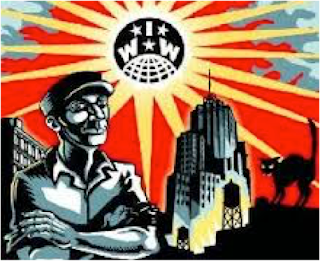Before I electronically entered the land of the Wobbly (Industrial Workers of the World) tribe I had been told by previous sojourners and observers who knew of my interest in the social and cultural construction of culture and ideology that the Wobblies had a very interesting ideological topography. According to these researchers the Wobblies, like most other humans before them and likely most other humans after them, divide up the world into two spheres: the sacred and the profane. In the category of the sacred is, for members of the contemporary Wobbly tribe, the man Wobblies seem to think of as kind of a prophet, Karl Marx, and the works of "the prophet", which the Wobblies regard as infallible sacred scripture. In the category of the profane is anyone who criticises, validly or not, the prophet, the sacred works of the prophet, and that key symbol of contemporary Wobbly culture, the utopian belief that "the working class"--ironically most contemporary Wobblies seem to be middle class intellectuals--is the essence of all that is good and pure in a profane world dominated and run by capitalist pigs and their running dog lackeys, a belief symbolised succinctly and pithily by the graphic art poster above with its radiant future brought to you by the Wobblies motif. Critics of Wobbly sacred culture are, researchers report, regarded by the Wobbly tribe as heretics and disbelievers and treated as such by the Wobblies.
Recently, a number of researchers have reported that a new category of profane has begun to emerge among current members of the Wobbly tribe, namely the belief that anyone who writes more than a few paragraphs and who uses words like fetishisation or social and cultural construction in their electronic posts is profaning the sacred culture of the Wobblies, a culture, of course, which Wobblies, have fetishised. What is fascinating about this conception of the profane among contemporary Wobblies is that it has become apparent among members of the tribe despite the fact that the works of their prophet run to several thousand pages and are littered with words like fetishisation, the labour theory of value and other technical philosophical and economic "jargon". Most researchers chalk the rise of this novel conception of the profane among recent Wobblies up to the rise of the new digital media and its negative impact on the attention spans of those who use electronic media, something that shows, contrary to Wobbly ideology, that culture is sometimes base.
What I can report at this point in my research is that my research thus far confirms the reports of previous observers. The Wobblies I encountered do have very definite notions of what is sacred and what is profane, do treat as heretics those who violate Wobbly sacred taboos, do inquisit those who violate Wobbly sacred taboos, and do react negatively to electronic posts they regard as too long and too full of multi-syllabic words. I can also report that I learned a few other things during my ethnographic sojourn among the Wobbly faithful. The posts they criticise for being too long and too verbose, in my experience, are only those posts they regard as profaning their holy of holies, their sacred prophet and his sacred works. This intellectual anti-intellectualism of the Wobblies I encountered may, in part, be a product of the comprehension, patience, and concentration problems wrought by the rise of new digital media with their cult of pithiness. It is also, if not more, the product of an ideological correctness grounded in the sense that they, the Wobblies, have a monopoly on truth. That's fetishisation. I learned that the official Wobby commitment to direct democracy is only skin deep. When the Board at the "coop" at which the Wobblies work and shop appointed someone to the Board who finished sixth in a direct membership election--three were elected--the Wobblies supported the Board action justifying the means by reference to the ends, the lawyer appointed was more union friendly and, as a result, more friendly to the Wobbly union they are trying to expand at the Coop. Ironically, a Board member who is opposed to unionisation in putatively cooperative settings also justified the means--appointing a lawyer who finished behind two others--by the end--it was expedient. Those Wobblies sure do wobble. All of this, by the way, makes the Wobblies I met online rather typical examples of the human species, particularly the bourgeois human species..
Author's note: There is a bit of the Nacirema tongue in cheek in this blog post. There are several serious points being made in it as well, I hope.

No comments:
Post a Comment